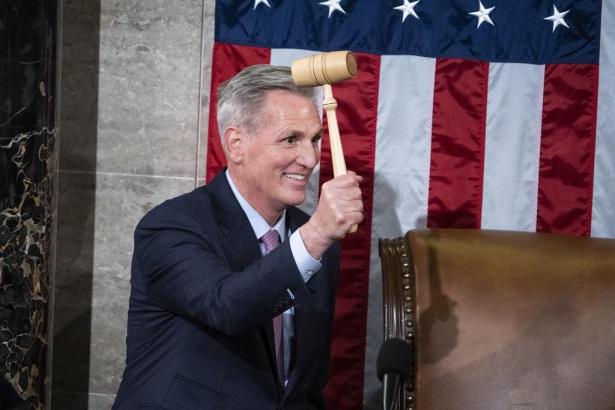Kevin McCarthy is one lucky guy that George Santos lied his way into Congress, because McCarthy needed every last vote to attain the Speakership in the wee hours of last Saturday morning.
Has there ever been a decline in leadership as precipitous as that between Nancy Pelosi and Kevin McCarthy? In the annals of American history, the only one that comes to mind is that between Abraham Lincoln and Andrew Johnson. The passing of the Danish throne from Hamlet’s father to his uncle Claudius also appears to have ended badly. McCarthy’s ascent was nowhere near so bloody, though it did feature one outraged McCarthy supporter, Rep. Mike Rogers (R-AL), being forcibly restrained from punching Matt Gaetz in the snoot after Gaetz and the Six reneged on their pledge to allow McCarthy to prevail on the 14th ballot.
When McCarthy was finally able to clamber to the rostrum and deliver his long-prepared inaugural remarks, it was roughly 1 a.m. (Eastern) on Saturday morning. The elders among us harked back to the acceptance speech of George McGovern, who claimed the Democratic presidential nomination on the final night of the party’s 1972 convention, which, because the session had been allowed to run too long, wasn’t delivered until three in the morning. Neither of those speeches did their speakers much good.
The striking thing about McCarthy’s speech, at least to those who’d managed to stay awake, was how it could have been delivered at any time since 1964, when, with Barry Goldwater at the helm, the Republicans first sought to roll back the New Deal. Its only allusions to contemporary particulars came when McCarthy listed the targets of coming GOP inquisitions (though the inclusion of the FBI on the GOP’s target list did mark an evolution in Republican thinking, which now appears to support right-wing insurrections so threatening that even the FBI has been compelled to check them out). Otherwise, McCarthy served up the time-honored Republican chestnuts of stopping spending, diminishing the debt, turning away immigrants, rejecting regulations, and going after wastefraudandabuse (it’s one word). Nowhere did he acknowledge that Americans could use some relief from medical expenses or the costs of child care and college educations, or that changes to the climate imperil us all.
McCarthy did pledge that Republicans would work to bring back the “hundreds of thousands of jobs that went to China,” tactfully neglecting to note that just a few months ago, House Republicans voted against the CHIPS Act, which was largely devised to do just that, by a 187-24 vote margin. Nor, for that matter, did he recall that 23 years ago, House Republicans voted to extend permanent normal trade relations to China, which permitted U.S. corporations to decimate American manufacturing and move the work across the Pacific, by a 164-57 vote margin, even as nearly two out of three House Democrats voted against the bill.
McCarthy was simply enunciating the radical, turn-back-the-clock, revanchist consensus within today’s Republican Party.
The new Speaker also vowed to hold the nation’s pledge to honor its debts hostage to reductions in spending, promising, in effect, a war on New Deal and post–New Deal government that neither Goldwater nor Ronald Reagan thought it responsible to wage, so potentially catastrophic to the world’s economy were its consequences. But to be concerned about such matters requires at least a rudimentary sense of cause and effect, and if House Republicans demonstrated anything last week, it’s that their capacity to foresee the results of their actions is completely nonexistent.
Nor was McCarthy’s declaration that he’d hold the debt hostage the outcome of furtive midnight deals with the Gaetzes of the caucus. To the contrary, he was simply enunciating the radical, turn-back-the-clock, revanchist consensus within today’s Republican Party. Every House GOPnik who seeks to lead the House Budget Committee, for instance, has already publicly proclaimed they’ll only support honoring our debts if we roll back our social safety net, comparatively threadbare though it may be. And McCarthy himself promised the same thing over two months ago. That’s sticking it to the libs, and if millions of non-libs, not least millions of pre-political kids, fall through the holes, well, some of them may in time be able to clamber back up. That’s the American way.
“Foul deeds will rise,” Hamlet predicts as he discovers his uncle has seized the throne by murdering his father, “though all the earth o’erwhelm them, to men’s eyes.” Whatever foul deeds McCarthy committed, or committed to, in the course of attaining the perch he has coveted for so long, they pale alongside the positions which his party has made plain to all. Those are the real foul deeds we will all have to battle.
===
Harold Meyerson is editor at large of The American Prospect.


Spread the word